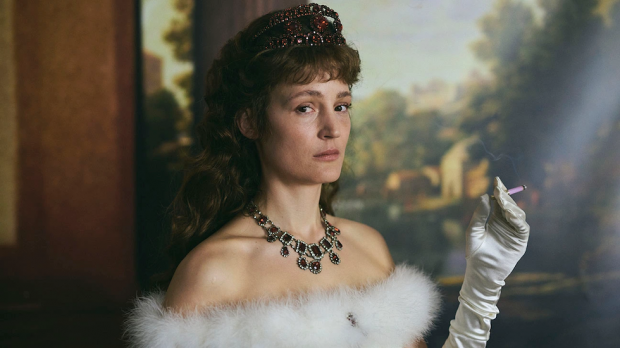
Directed by Marie Kreutzer
Starring Vicky Krieps, Florian Teichtmeister, Finnegan Oldfield, Colin Morgan
Empress Elizabeth ‘Sissi’ of Austria (Vicky Krieps) is fighting to keep up with her lavish image of beauty and monarchy. In a bout of existential dread (the royal kind), she traverses across Vienna and into neighbouring countries, visiting old friends and lovers, trying to reclaim a piece of her identity that others are throwing away.
Krieps does well in a limited performance, though it’s not really one of the more fleshed out period piece characters in recent years. Despite the film centring around her, she seems to be the most annoying aspect of it. She’s very passive, sulky and bratty, portrayed as someone who’s not particularly strong or strongly written. The path she takes in this story just comes across as episodic and piecemeal, with not much culmination of her actions – the final scene shows her taking an ambiguous leap, but the power of this moment doesn’t have much that built up to it.
Despite the trouble in trying to get invested and sympathise with this unlikable main character, at least where the film takes her is of much more interest. The film is set in the 1870s, but there’s a sense of the film looking ahead 90 years at the counterculture, with women’s liberation very much at the forefront, along with the increase in heroin use. Getting a look into this world is what fascinates, and even using a character like Sissi can give us an idea of the kind of transitional world she was living in at the time.
It appears that the world of cinema can’t get enough of Sissi and have made countless of different films and TV shows about her, with five coming out in just the past year. It sounds like the real-life Sissi was far less of the proto-feminist she’s protrayed in this film: she was obsessed with beauty, and despised both ugly and poor people. She even mistreated her own family, including her son shortly before he committed suicide, so portraying this woman who was nasty in real life and giving her an unapologetic “feminist” angle seems to be rather course and ignorant.
A more exploratory, more straight-forward, and more truthful account of her life (even if just glimpsing a year) may be available in these other works, but for Corsage, it is a well produced, but messy attempt at demystifying and humanising the woman behind the attire.
DAVID MORGAN-BROWN
Corsage plays at UWA’s Somerville Auditorium from Monday, November 28 to Sunday, December 4, 2022. For more information and to buy tickets head to perthfestival.com.au
Notifications